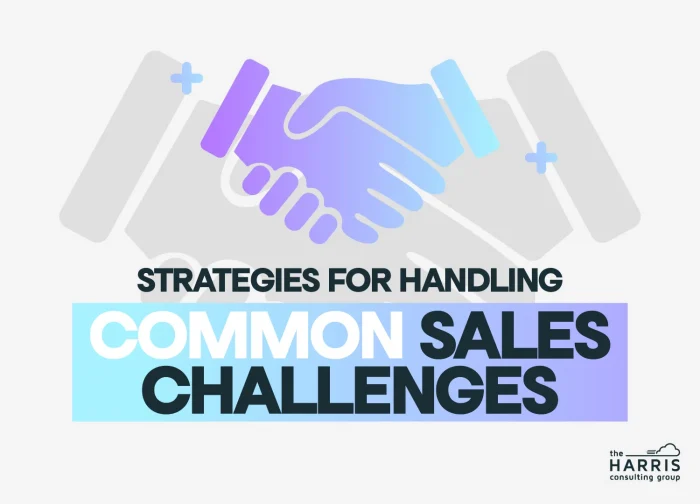In the world of sales, challenges are as common as they are diverse. From overcoming objections to dealing with decision-maker changes, sales professionals constantly navigate over the hurdles.
Adopting effective strategies not only helps in overcoming these challenges but also elevates the sales process, aligning with the N.E.A.T. Selling™ methodology‘s vision. Here you have actionable strategies to handle some of the most common sales challenges. This will empower sales professionals to enhance their skills and improve the buyer’s experience.
1. Overcoming price objections
Everyone asks for a discount, you know it, I know it, they know it, we all know it. Regardless of the value you think you have presented, everyone asks for a discount.
Humans are comparison shoppers by nature. At this point in the world, nobody should ever be surprised. Since we should not be surprised we should have a multitude of strategies to have this conversation.
Dealing with these objections requires strategically shifting the conversation from a focus on cost to a spotlight on value. By going deep in an empathetic way around your customers’ needs, wants, and desires you will be able to drive their real pain around economic impact.
By emphasizing how your offering addresses a critical problem or meets a specific need, you can alter the perception of its worth. Incorporating success stories and case studies can serve as powerful tools in this reframing. These tools provide tangible evidence of your value proposition.
Authenticity is paramount in these discussions. Prospects are adept at discerning genuine insight from mere sales pitches. Ensuring that your narrative around the value of your product or service is both sincere and compelling is critical.
This approach aids in overcoming initial price objections and builds a foundation of trust between you and your potential customers. This will pave the way for a more profound and lasting business relationship.
2. Navigating decision-maker changes
Changes in the decision-making unit can significantly disrupt the sales cycle. It can also lead to unwelcome delays or, worse, deal cancellations. To mitigate this risk, sales professionals must adopt a proactive approach by expanding their network within the client’s organization from the outset.
This involves building robust relationships across various levels and departments, laying a strong foundation for understanding the broader organizational landscape. It enables sales professionals to collect insights regarding the organization’s unique challenges and objectives. By doing so, they enrich the sales strategy with a more nuanced understanding of the client’s needs.
3. Dealing with long sales cycles
Long sales cycles present a significant challenge in the sales world. They demand a blend of patience and strategic efficiency from sales professionals. The cornerstone for managing these extended timelines lies in the commitment to consistent follow-ups and a focus on nurturing meaningful relationships with prospects.
By implementing a well-structured follow-up strategy, sales teams can ensure that each interaction adds substantial value, moving beyond mere check-ins. This could involve sharing tailored content, offering insights into industry trends, or providing a thoughtful analysis of competitors.
Through this methodical nurturing process, sales professionals can effectively bridge the gap between initial contact and deal closure. Moreover, they can reinforce the importance of patience, perseverance, and strategic engagement. These features can conquer the challenges posed by long sales cycles.
4. Handling Competition
In a competitive market, distinguishing yourself is crucial. A thorough understanding of your competition is important. However, the most important step is to emphasize the uniqueness of your offering.
Tailor your pitch to specifically highlight how your product or service meets the individual needs and challenges of your prospect. The authenticity of your approach and a deep grasp of what sets your value proposition apart are indispensable assets in this context.
It’s not just about the sale; it’s about showing the tangible benefits and outcomes that your product or service can deliver. Thereby affirming its unique position and value in the marketplace.
5. Converting Prospects to Customers
Conversion stands as the main goal of the sales process, where understanding the buyer’s journey becomes crucial. By leveraging the N.E.A.T. Selling™ methodology, sales professionals can navigate through this journey with precision and effectiveness.
It’s about digging deep into the prospect’s core needs. By understanding how your solution can economically impact their business, you’re engaging with the decision-maker, and aligning your proposal with their implementation timeline.
This tailored approach is what differentiates a successful sales strategy from a standard pitch. By focusing on the critical components of Need, Economic Impact, Access to Authority, and Timeline, sales professionals can craft proposals that are highly relevant to the prospect.
It’s a method that goes beyond selling. It fosters a connection based on understanding and addressing the unique challenges and opportunities faced by the buyer. In doing so, it aligns sales strategies with the buyer’s objectives. This paves the way for not just a sale, but a meaningful partnership that is beneficial for both parties.
Conclusion
Sales challenges are an intrinsic part of the sales landscape, presenting not just obstacles but valuable opportunities for personal and professional growth. When sales professionals harness effective strategies, they are better equipped to overcome the common hurdles that stand in their way. As a result, it improves performance and a more positive experience for the buyer.
Adopting these principles as core values is crucial. They serve as a foundation for individual success and as pillars supporting the broader mission of elevating the sales process.
By embracing these challenges as essential components of the sales journey, professionals can:
- refine their skills,
- align with our mission of providing top-tier sales training, and
- contribute to a sales environment that prioritizes client success above all.
This approach ensures that the path to mastering the art of sales is one marked by perseverance, dedication, and a relentless pursuit of excellence.
Do you want to refine your sales strategies and equip your team with effective sales techniques? Let’s do it together!







